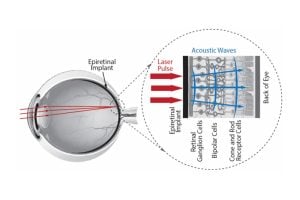
Retinitis pigmentosa is a thief, gradually stealing the eyesight of an estimated two million people around the world. Currently, there are no effective treatments to stop or correct the damage caused by this inherited ailment, which kills off photoreceptor cells in the back of the eye.
A groundbreaking new material developed a team of Hopkins researchers—including Professor and EP Materials Science and Engineering Program Chair James Spicer—could change that. When made into a retinal implant and activated by laser illumination, the biocompatible nanocomposite material shows promise in acoustically stimulating cells in the diseased retina, sending signals to the brain’s visual cortex.
“Polymer Matrix Nanocomposites as Photoacoustic Transmitters for Epiretinal Prosthetics” was presented at the 2023 IEEE 23rd International Conference on Nanotechnology in South Korea last summer.